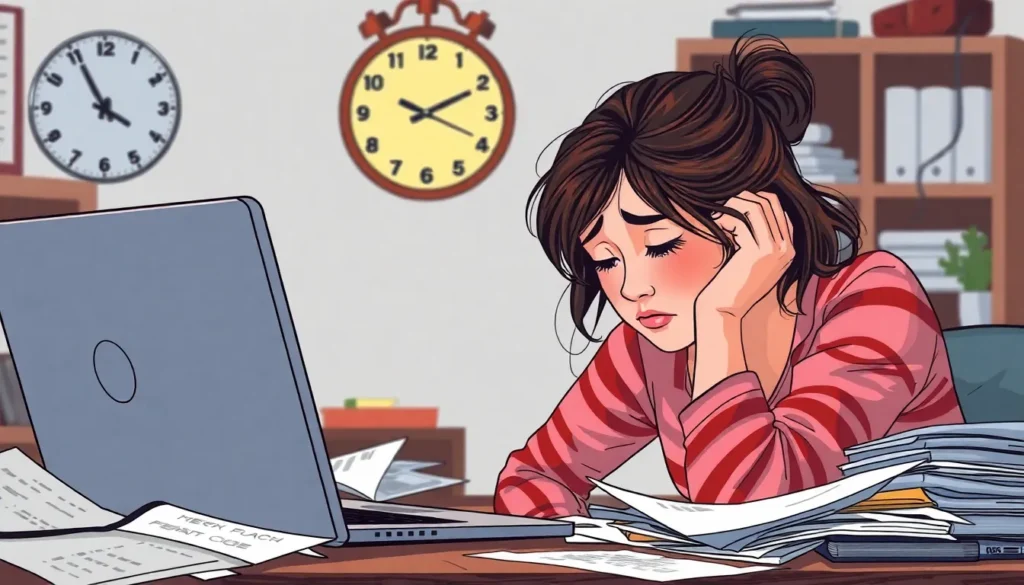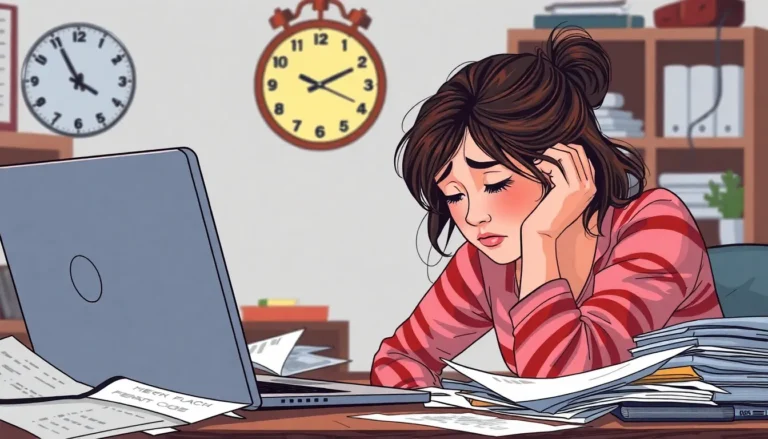In a world that glorifies the grind, hustle culture has become the badge of honor for many. It’s the relentless pursuit of success that often leaves people feeling like they’re sprinting on a treadmill—working hard but getting nowhere. While ambition is admirable, the constant pressure to hustle can turn into a toxic cycle that drains energy and joy.
Imagine waking up every day feeling like a hamster on a wheel, racing toward an ever-elusive finish line. The truth is, this hustle mentality can lead to burnout, anxiety, and a serious case of the Mondays. It’s time to take a step back and question whether this relentless drive for productivity is really worth sacrificing well-being. After all, life’s too short to be perpetually busy without actually living.
Table of Contents
ToggleUnderstanding Hustle Culture
Hustle culture embodies an attitude of relentless pursuit of success. This mindset often prioritizes work over personal well-being and relationships.
Definition of Hustle Culture
Hustle culture refers to a societal trend that glorifies constant work and productivity. Individuals within this culture often equate self-worth with achievements and output. Emphasis on a ‘grind’ mentality creates pressure to work long hours, often at the expense of physical and mental health. Results-driven expectations lead many to sacrifice sleep, leisure, and personal time. This phenomenon fosters an environment where taking breaks is viewed as laziness, perpetuating a cycle of stress and burnout.
Historical Context
Hustle culture has roots in the American Dream, promoting the idea that hard work leads to success. Industrialization in the late 19th century spurred a focus on productivity and economic growth. During the 20th century, the rise of the corporate environment intensified these ideals with a focus on climbing the corporate ladder. As technology advanced in the 21st century, digital connectivity blurred the lines between work and personal life. Accessibility to work anytime created an expectation for constant availability. This evolution reinforced hustle culture’s hold, making it a pervasive aspect of modern life.
Negative Impacts of Hustle Culture

Hustle culture inflicts several detrimental effects on individuals’ lives, particularly concerning mental and physical health.
Mental Health Effects
Anxiety levels spike among those deeply entrenched in hustle culture. Depression occurs frequently in individuals who equate their self-worth with productivity. Stress becomes a constant companion, as the pressure to achieve leads to overwhelm. Without adequate breaks, burnout typically materializes, leaving individuals exhausted and unmotivated. Research indicates that nearly 70 percent of workers experience symptoms of burnout. Moreover, the stigma surrounding mental health prevents many from seeking help, exacerbating their struggles. Social isolation also takes hold, as the focus on work overshadows the importance of relationships.
Physical Health Consequences
Sleep disturbances commonly affect those who embrace hustle culture. Fatigue can lead to decreased immune function, increasing susceptibility to illness. Without proper rest, cognitive function declines, impairing daily performance. Chronic stress contributes to cardiovascular issues, with studies showing a 50 percent increase in heart disease risk among overworked individuals. Additionally, neglecting nutrition often results in unhealthy eating habits, further impacting overall health. The incessant grind fosters an environment where physical well-being takes a back seat to relentless demands. In essence, the pursuit of success comes at a significant cost to physical health.
Alternatives to Hustle Culture
Rethinking work culture focuses on balance and well-being rather than constant productivity. Exploring alternatives can provide healthier, more fulfilling approaches.
Embracing Work-Life Balance
Prioritizing work-life balance leads to improved overall health and productivity. Individuals benefit substantially from time dedicated to personal interests and relationships. Setting clear boundaries between work and home life enables better mental well-being. Flexibility in scheduling allows for more quality time with family and friends. Encouraging leisure activities outside of work fosters creativity and satisfaction. Studies show that 62 percent of employees report increased job satisfaction when they maintain a good work-life balance.
Importance of Rest and Recovery
Recognizing the importance of rest and recovery is vital in combating burnout. Taking regular breaks encourages greater focus and creativity. Adequate sleep directly impacts cognitive function and mood, making it essential for long-term success. Engaging in restorative activities, such as meditation or leisure reading, enhances mental health. Research indicates that consistent downtime improves productivity by 20 percent. Integrating self-care practices into daily routines leads to more sustainable energy levels and overall well-being.
Personal Stories and Testimonials
Many individuals share their experiences with the pressures of hustle culture. They recount the physical and emotional toll that constant work demands. A software engineer reported feeling exhausted despite working countless hours. Frustration mounted as she equated her value with output, leading to feelings of isolation. Burnout became an all-too-familiar reality, with nearly 70 percent of workers stating they encounter similar symptoms.
Successful stories reveal a shift away from hustle culture. One entrepreneur left her demanding position to pursue creative passions. Empowered by newfound balance, she improved her mental clarity and enhanced her productivity by 20 percent. Another individual began prioritizing self-care, leading to better relationships and improved health. These transformative journeys illustrate the importance of personal well-being over relentless work. By establishing boundaries and embracing restorative practices, individuals can reclaim their lives from the grips of hustle culture.
Hustle culture may seem appealing with its promises of success and achievement but its toll on mental and physical health is undeniable. The relentless pursuit of productivity often leads to burnout anxiety and a diminished sense of self-worth. By recognizing the harmful effects of this mindset individuals can begin to prioritize their well-being over constant busyness. Embracing balance setting boundaries and allowing for rest are essential steps toward reclaiming a fulfilling life. It’s time to shift the focus from merely being productive to truly living and thriving.








